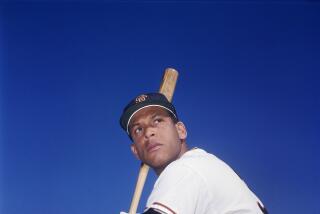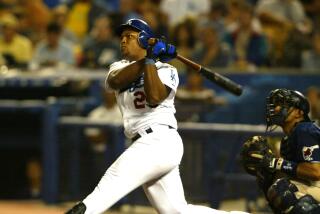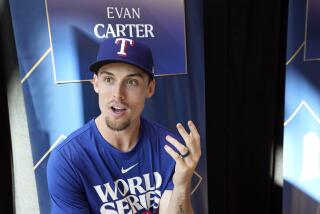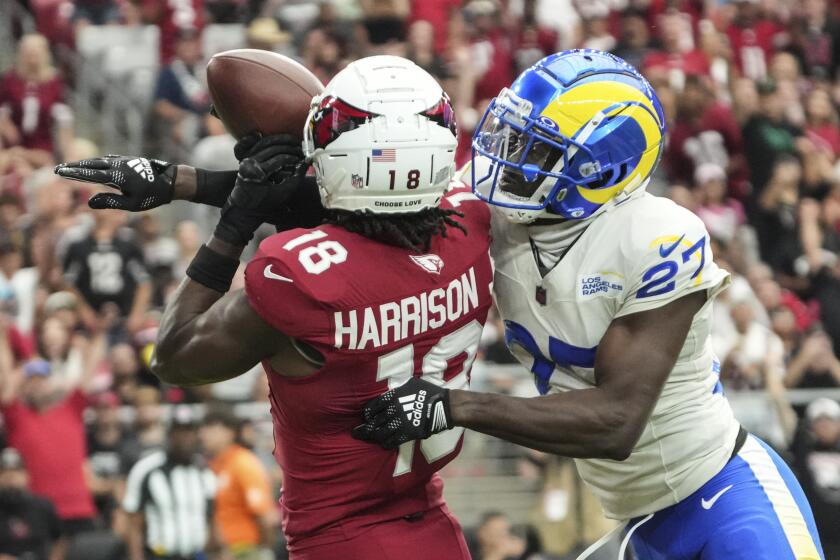It Was 13 Years Ago That an 18-Year-Old Kid Named David Clyde : Pitched Rangers Out of a Jam--and Himself, Perhaps, Into One : FROM BASEBALL TO TOMBALL
TOMBALL, Tex. — David Clyde is a hardware buyer, salesman and secretary-treasurer for a lumber company in this tiny town about 40 miles northwest of Houston. He hasn’t been to a Ranger game in years. Doesn’t plan to go, either.
But the way Clyde figures it, the Rangers are in Texas today because of an 18-year-old, left-handed pitcher fresh out of high school who didn’t know any better.
His name, ta-da! was David Clyde.
“I don’t think I’m a hero in a typical sense,” he says. “I don’t want to sound like I’m bragging, but I think it’s a fact that I kept major league baseball in north Texas. But the Rangers don’t owe me anything and I don’t want anything from them. Baseball doesn’t owe me anything.”
On a warm June afternoon in 1973, Clyde arrived at Arlington Stadium for his major league debut. Television crews and newspaper reporters recorded his every move. “I’ve never seen anything like it,” said Randy Galloway, a columnist for the Dallas Morning News who covered the Rangers at the time.
See David Clyde walk into the clubhouse.
See David Clyde tie his shoelaces.
See David Clyde adjust his cap.
In an unusual move, Texas Manager Whitey Herzog even allowed reporters to interview Clyde before the game, as well as to follow the pitcher to the mound during his warmup. A sellout crowd of 35,500, the first since the franchise had arrived in Texas from Washington a year earlier, applauded Clyde as he returned to the dugout. About 10,000 other fans were turned away at the ticket windows.
Several months earlier, Clyde had been busy worrying about prom night or helping Westchester High School win a state championship. Now he had a big league contract, a full house and an amateur resume that included an 18-0 senior season, an 0.18 earned-run average, five no-hitters and an astounding 328 strikeouts in 148 innings. History awaited, as did a telegram from his boyhood idol:
“Good luck, No. 32. Go get ‘em.” --SANDY KOUFAX The Rangers played the Minnesota Twins that night. Clyde walked the first batter he faced. And the second.
Clyde, his father and his great uncle had negotiated the contract with the Rangers. He received a $65,000 signing bonus--cheap for a No. 1 pick--and about another $22,000 in salary, plus incentive clauses. Clyde says now that he was worried that owner Bob Short, strapped for cash, wouldn’t be able to afford him if he asked for more. “I wanted to play professional baseball.”
With runners on first and second and the Arlington Stadium audience beginning to wonder what all the fuss was about, Clyde struck out the side.
Clyde allowed a two-run homer in the second inning to Mike Adams--Adams would hit two more home runs in his five-year major league career--and walked five more but gave up nothing else until he left the game in the fifth. He struck out eight. “It was a dream come true,” he says. “It was like an actual dream.”
The dream didn’t last, though. By season’s end, Clyde had a 4-8 record and 5.03 ERA. He was unpolished, naive and confused. Such expectations, so little help. “It was like taking a kid and throwing him into brain surgery without going to medical school,” Clyde says.
“I think if I would have started out at the very bottom, like the rookie league, and gone 4-0, 5-1, they would have moved me up to A-ball,” he says. “If they would have done something like that, I think I’d still be in the big leagues today. But it’s almost impossible for an 18-year-old kid to have it dropped in your lap and say no.”
By 1981, Clyde was out of baseball. The Rangers, said Galloway, “used (Clyde) as a lightning rod.”
Says Clyde: “I was definitely (used). I was an instant cash flow, that’s what I was.”
The Rangers were sold in 1974. New owner Brad Corbett was intrigued with Clyde and his drawing power. New Manager Billy Martin preferred sending Clyde to the minors for several weeks. Bobby Brown, the recently appointed club president and now the president of the American League, recommended that Clyde be sent down for the remainder of the year.
Clyde stayed, but rarely pitched, and Brown quit.
“That was in 1974, where it was a very successful year for the Rangers (they won 84 games and finished second in the division), but it was a very tumultuous time for myself,” Clyde says. “Virtually all my confidence had been destroyed. I got caught in a power play with Martin and the front office.”
By the time Clyde was through with baseball, he had spent time in the minors, been traded to the Cleveland Indians, undergone two shoulder operations, been traded back to the Rangers, attempted a comeback in the Houston Astro organization, overcome an alcohol problem and survived two divorces.
Now he’s on his third marriage and enjoying the quiet life. “Rush hour here (in Tomball) is 15 cars,” says Clyde, 31. “I go to Houston once in a while, but people just as soon shoot you over a little fender-bender, much less looking at you. Here, I can dove hunt off the front porch. And if my wife would let me, I’d deer hunt.
“I’ve got a couple of pieces of property. I’ve got a home here and I’m in business with my in-laws. I know where I’m going to be tomorrow and I know where I’m gonna be next week.
“See, I got out of baseball because it wasn’t what I wanted anymore. It wasn’t my dream anymore.”
Clyde hasn’t thrown a baseball for years. A semipro team approached him about a comeback of sorts, but Clyde said no, though he says the shoulder operations “didn’t take anything away from me.” He helps coach a Little League team and nothing else.
Despite the heartaches, Clyde says he wouldn’t change anything. Then again, he wouldn’t want anyone to go through the same ordeal.
“It’s going to have to be a very, very, very, very special person,” he says. “I thought I could do it. Al Kaline, Bob Feller are the two I can think of who have played straight out of high school and were Hall of Famers.
“Yesterday, it could happen. In today’s world, I’d say the chances of that happening are slim and none, and slim has had his bags packed and been on the taxiway waiting for the plane to take off.”
More to Read
Go beyond the scoreboard
Get the latest on L.A.'s teams in the daily Sports Report newsletter.
You may occasionally receive promotional content from the Los Angeles Times.










